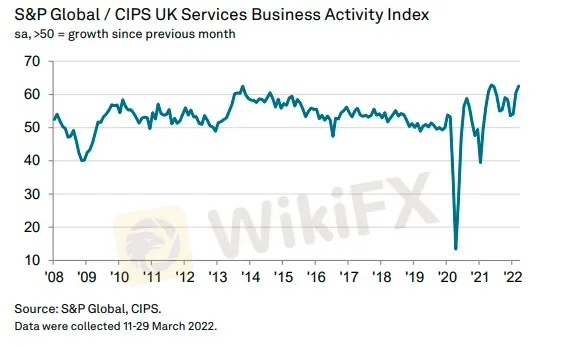简体中文
繁體中文
English
Pусский
日本語
ภาษาไทย
Tiếng Việt
Bahasa Indonesia
Español
हिन्दी
Filippiiniläinen
Français
Deutsch
Português
Türkçe
한국어
العربية
UK service sector gains momentum,
Abstract:despite fastest rise in output charges since the survey began in July 1996
Key findings
Embargoed until 0930 BST (0830 UTC) 5 April 2022
News Release
S&P Global / CIPS UK Services PMI®
Source: S&P Global, CIPS.
UK service providers signalled an exceptionally strong
increase in business activity during March and the rate of
expansion accelerated to its fastest for 10 months. Survey
respondents widely noted that the removal of pandemic
restrictions and return to offices had led to a sharp rebound
in customer demand.
However, business expectations for the year ahead dropped
for the second month running and were the lowest since
October 2020. Weaker optimism was mainly linked to the war
in Ukraine and subsequent economic uncertainty. Severe
cost pressures also weighed on confidence and led to a rapid
rise in output charges. The rate of prices charged inflation
was the steepest since the index began in July 1996.
The headline seasonally adjusted S&P Global / CIPS UK
Services PMI® Business Activity Index rose for the third
month running to reach 62.6 in March, up from 60.5 in
February. This highlighted a continued rebound in output
growth from the Omicron-related slowdown seen at the
end of last year. Moreover, the rate of expansion was the
second-strongest since May 1997 (exceeded only by the
post-lockdown recovery in May 2021).
Higher levels of business activity were supported by a strong
rise in new work during March. More than twice as many
survey respondents (31%) reported an increase in new orders
as those that signalled a fall (15%). Businesses operating in
the travel, leisure and entertainment sectors commented on
especially strong demand during the latest survey period.
Greater business requirements and robust long-term
expansion plans fuelled another month of strong job
creation in March. The latest rise in staffing numbers was the
fastest since October 2021. Survey respondents suggested
that tight labour market conditions had made it difficult to
fill vacancies and pushed up starting salaries.

Recruitment difficulties, capacity constraints and worsening
supplier performance all contributed to an increase in
backlogs of work across the service economy in March.
Higher levels of unfinished business have been recorded in
each of the past 13 months, although the latest rise was the
slowest so far in 2022.
An unprecedented 40% of the survey panel reported an
increase in their average prices charged in March, while only
3% signalled a decline. The resulting seasonally adjusted
Prices Charged Index pointed to the strongest rate of
inflation since the survey began in July 1996.
Another rapid rise in output charges was overwhelmingly
linked to higher salary payments and increased prices paid
for energy, fuel and raw materials. Around 65% of the survey
panel reported a rise in their operating expenses in March,
while less than 1% noted a decline. The latest index reading
signalled the second-fastest rate of input cost inflation since
the survey began (exceeded only by the record high seen last
November).
Concerns about the impact of escalating inflationary
pressures on household budgets acted as a brake on growth
expectations across the service sector in March. Survey
respondents also cited uncertainty related to the war in
Ukraine and greater hesitancy among clients. The overall
degree of positive sentiment regarding the business outlook
dropped to its lowest for 17 months.
Disclaimer:
The views in this article only represent the author's personal views, and do not constitute investment advice on this platform. This platform does not guarantee the accuracy, completeness and timeliness of the information in the article, and will not be liable for any loss caused by the use of or reliance on the information in the article.
Read more

Mumbai Police Nabs Black Paper Dollar Conversion Forex Scam Perpetrators: Check Out the Details
The crime branch of the Mumbai Police has nabbed a racket involved in duping people by claiming to convert black paper into dollars. Check this unique 24.7-lakh scam story.

CME International Records a Massive Jump in Forex Volumes
CME International recorded a record surge in its foreign exchange trading volumes during the second quarter. Check out its performance across products and markets.

New to Forex Trading in India? Here's How You Can Start and Maximize
Want to begin your forex trading journey in India? Here's a guide that will help you open and close trading positions effectively, resulting in enhanced returns and minimized risks.

Forex Interbank Rate & How It Influences Your Trading
A forex interbank rate is nothing but the wholesale currency exchange rate that banks and other major financial institutions use to trade currencies among themselves. Read more about it.
WikiFX Broker
Latest News
XTB Hack 2025: Major Security Breach Exposes Client Accounts
These are America's 10 weakest state economies most at risk in a recession
These are America's 10 strongest state economies best prepared for a recession
Federal Reserve quietly responds to Trump administration attacks over renovation
Tariff Windfall Drives Surprise $27 Billion US Budget Surplus In June
Top Wall Street analysts are upbeat about these dividend-paying stocks
Singapore's economy grows 4.3% in second quarter, beating expectations
What WikiFX Found When It Looked Into Emar Markets
MT4 vs MT5 Which Forex Trading Platform Fits Your Needs in 2025?
Stock futures slide on more Trump tariff letters, but are off worst levels of session: Live updates
Currency Calculator


